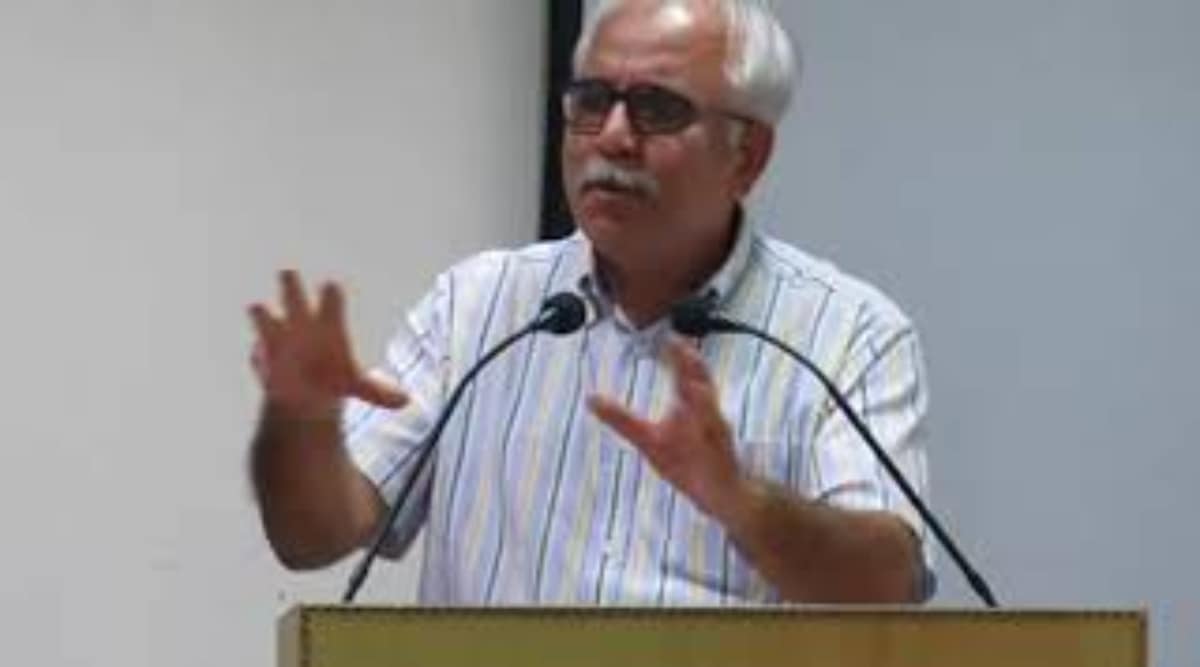 Bhairabi Prasad Sahu (Twitter/@IndianHistory_C)
Bhairabi Prasad Sahu (Twitter/@IndianHistory_C) One of the leading historians of our times, Bhairabi Prasad Sahu, died on March 3, barely three months before he was to retire from the department of history, University of Delhi. Sahu was known for his numerous works on early Indian history, as well as his commitment to teaching and mentoring students. The community of historians, his colleagues and students are shocked by the untimely demise of a scholar of his calibre and productivity.
An alumni of Delhi University, his doctoral research, later published as a monograph (1988), was in the field of archaeology, and focused on the faunal remains from the palaeolithic to the neolithic contexts in the Indian subcontinent. Scholars like Gordon Childe had proposed the idea of a neolithic “revolution”, suggesting a radical transformation in subsistence strategies for communities dependent on hunting and gathering, who had now turned to herding. Sahu broadly agreed with the view that a qualitative change in the life of people, related to the development of sedentism, private property and other social institutions, can be traced to the emergence of pastoralism in prehistoric times. In an article ‘Animal Use in Ancient India’ (1987), he turned his attention to the early historic period and discussed the plentiful availability of archaeological data on meat eating, and concluded that beef was an important part of the diet in several parts of ancient India. The implications of this work were significant, and in later years his teacher and then colleague D N Jha wrote a full monograph on the subject of beef-eating in ancient India, countering upfront the communal narrative of its association with Muslims (and Christians).
It seems that Sahu’s attention was drawn to the early history of Odisha (1984) even while he was completing his thesis. Critically examining the view that Ashoka’s Kalinga war had ramifications as far as the development of state society in the region was concerned, he went on to discuss the nature of the state as revealed through the epigraphic sources of the early historic and early medieval period. This was the beginning of an academic engagement that defined his oeuvre as a scholar. The seminal works of B D Chattopadhyaya and Hermann Kulke provided the blueprint for several historians unable to reconcile with the top-down approach of historical change that a previous generation of scholars such as D D Kosambi and R S Sharma had proffered.
While the latter were the harbingers of the study of socio-economic aspects instead of dynastic history, it was suggested that there were possibilities for understanding things differently if the local and the regional were brought into play. This model pioneered the understanding that historical regions can have different processes as well as pace of growth, leading to political, economic as well as social and cultural structures.
Sahu took these ideas forward in his evocatively titled collection of articles, Changing the Gaze: Regions and the Construction of Early India (2014). The work challenged the tendency to view regions as ossified, unchanging entities; advocating a focus that locates sub-regional as well as trans-regional connections. In The Making of Regions in Indian History: Society, State and Identity in Premodern Odisha (2020), he brought a sharper focus on the issue of integrative processes in Odisha’s history, from the time of Ashoka and Kharavela to the dynasties of the Bhaumakaras and Eastern Gangas. Chauvinistic claims of the present often get telescoped into the past when it comes to regional identity, and there is an insistence on seeing modern contours instead of historical regions. Sahu’s scholarship on premodern Odisha and on the evolution of regions has important implications for the way in which we understand history in general, and how it is taught at all levels.
Sahu served as the joint secretary (1999-2002) and secretary of the Indian History Congress (2006-2009), as well as a member of its executive committee on several occasions. A regular at the annual sessions of the IHC since his student days in the University of Delhi, he presented numerous papers and was committed to the strengthening of this body of professional historians. The responsibility of carrying forward the ideals and vision of the founding members of the IHC of encouraging scientific temper and rigorously researched history has fallen on successive generations of scholars since the time of its inception in 1935. BP Sahu stands tall among them. The history fraternity will miss him, but his scholarship will remain relevant for our times.
The writer is professor of history at the Jawaharlal Nehru University and secretary, Indian History Congress
- The Indian Express website has been rated GREEN for its credibility and trustworthiness by Newsguard, a global service that rates news sources for their journalistic standards.

